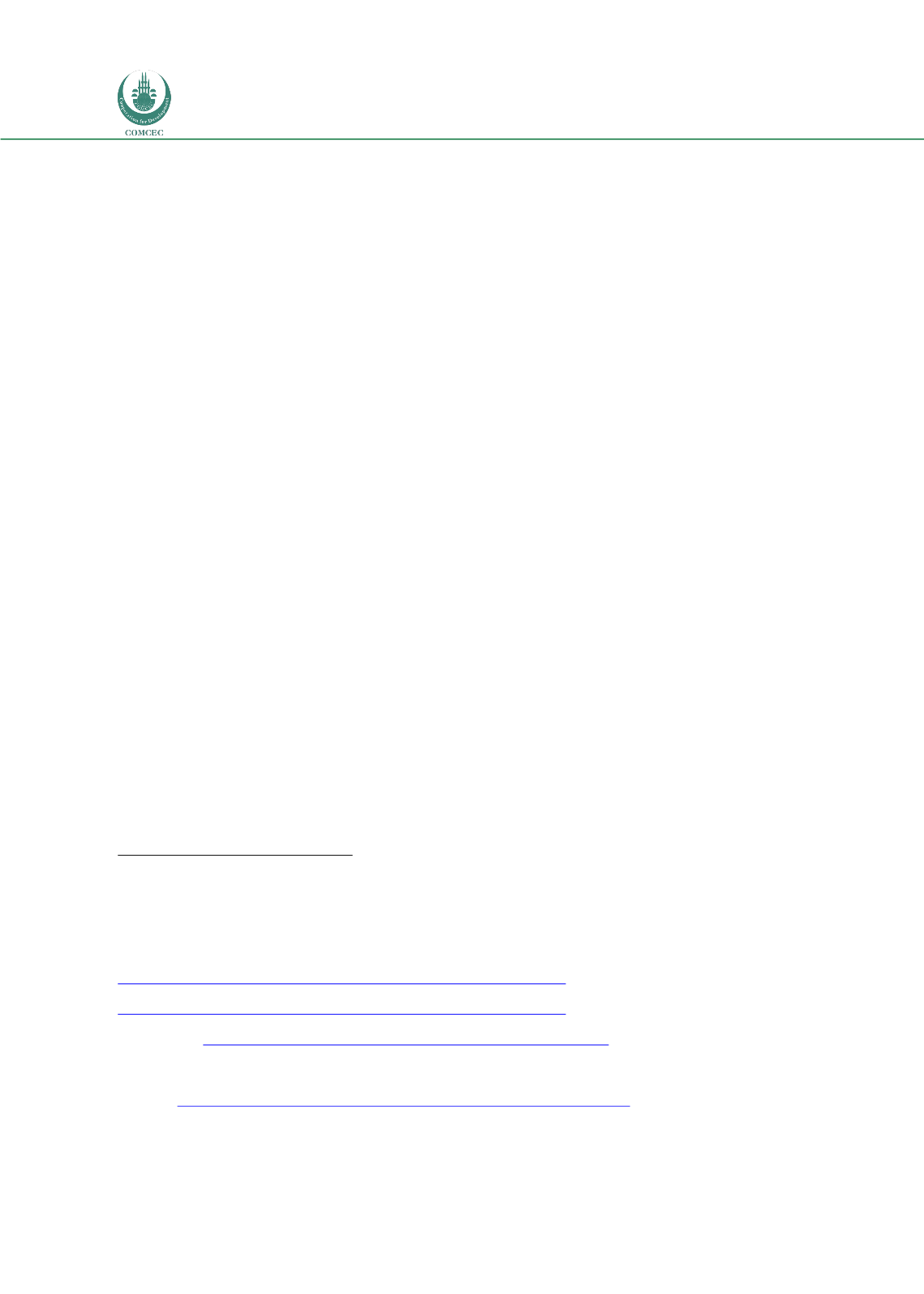

Forced Migration in the OIC Member Countries:
Policy Framework Adopted by Host Countries
82
All protection beneficiaries are allowed to access primary and secondary medical services
spontaneously and free of charge, and tertiary services with a referral or in case of an
emergency.
76
The mass influx of forced migrants has overburdened hospitals, leading some medical
providers to seek transfers out of the region due to overwork.
77
The logical group to relieve
the burden would be Syrian doctors, who have both medical training and Arabic language
skills. However, they still face obstacles to accreditation in Turkey, especially given that many
fled without their professional certification documents.
78
Beginning with a Ministry of Health
Directive of November 2015, future policy will aim to create Migrant Health Centers staffed by
Syrian doctors, in order to benefit from the skills of migrants themselves and overcome the
language barrier between patient and provider, as well as to relieve the overburdening of
hospitals in border provinces.
79
A major contribution toward the goal of establishing Migrant
Health Centers has been made by the World Health Organization, which in partnership with
the University of Gaziantep has conducted Refugee Doctor Adaptation Training (ReDAT)
courses in which 200 Syrian doctors have been trained in Turkish medical procedures.
80
Both international and local NGOs have made contributions to health services for forced
migrants in Turkey. NGOs currently run 16 health facilities providing care to Syrians, and
medical kits provided through the WHO have covered 170,000 outpatient treatments.
81
Large
international NGOs (INGOs) initially had difficulty establishing operations in Turkey, but after
2013 the government allowed for full registration of INGOs, which gave them the opportunity
to provide first response services in the border regions.
82
INGOs such as International Medical
Corps and Mercy Corps, as well as the World Food Programme, currently assist in
humanitarian response at the border and work with local partners to establish and manage
health centers in border cities and in Istanbul.
83
It has been noted that sometimes refugees
prefer these to official government centers due to lack of trust in Turkish authorities.
84
NGOs
such as the Danish Refugee Council also provide translation services for forced migrants
wishing to navigate the Turkish medical system, and SGDD/ASAM has printed guides that
explain how to access active medical facilities in towns where protection beneficiaries
reside.
85
The provision of health services to forced migrants in Turkey faces a wide range of
implementation barriers that have yet to be overcome. One critical barrier to successful
implementation of policies in the health sector and beyond is the increased waiting time for
76
Refugee Rights Turkey,
Country Report: Turkey,
87, 130.
77
Osman Bahadır Dinçer et al.,
Turkey and Syrian Refugees: The Limits of Hospitality
, 18.
78
Grisgraber and Hollingsworth,
Planting the Seeds of Success? Turkey’s New Refugee Work Permits
, 7.
79
Hospitals in southern provinces have seen workloads increase by 30-40 percent. See World Bank,
Turkey’s Response to the
Syrian Refugee Crisis and the Road Ahead
, 9, 11; Grisgraber and Hollingsworth,
Planting the Seeds of Success? Turkey’s New
Refugee Work Permits
, 7.
80
World Bank,
Turkey’s Response to the Syrian Refugee Crisis and the Road Ahead
, 9.
http://www.who.int/hac/crises/syr/syria_crisis_snapshot_turkey_june2015.pdf81
World Health Organization, “Country brief and funding request: January to June 2015”
http://www.who.int/hac/crises/syr/syria_crisis_snapshot_turkey_june2015.pdf82
Sema Genel, “Turkey and humanitarian assistance” in
Perspectives: Political Analysis and Commentary – Turkey,
Issue 8,
April 2014, 43
, https://www.boell.de/sites/default/files/perspectives_turkey_8_eng.pdf .83
Cihangir Karabıyık (Director of Turkish Legal Affairs, International Medical Corps - Turkey) in conversation with Kathleen
Newland, May 3, 2016; Metin Çorabatır,
The Evolving Approach to Protection in Turkey
, 16; İltica ve Göç Araştırmaları
Merkezi (İGAM),
Sivil Toplum Örgütlerinin Türkiye’deki Suriyeli Mülteciler İçin Yaptıkları Çalışmalar İle İlgili Raporu
(İGAM,
2013), 17
, http://www.igamder.org/wp-content/uploads/2012/06/Suriye-STK-Raporu.pdf .84
Cihangir Karabıyık, in conversation with Kathleen Newland, May 3, 2016.
85
İbrahim Vurgun Kavlak (General Coordinator, SGDD/ASAM) in conversation with Kathleen Newland, May 4, 2016;
Refugee Rights Turkey,
Country Report: Turkey.
131.
















